人教版(2019) 选择性必修第三册Unit 2 Healthy Lifestyle Listening and Speaking课件(38张ppt)
文档属性
| 名称 | 人教版(2019) 选择性必修第三册Unit 2 Healthy Lifestyle Listening and Speaking课件(38张ppt) |
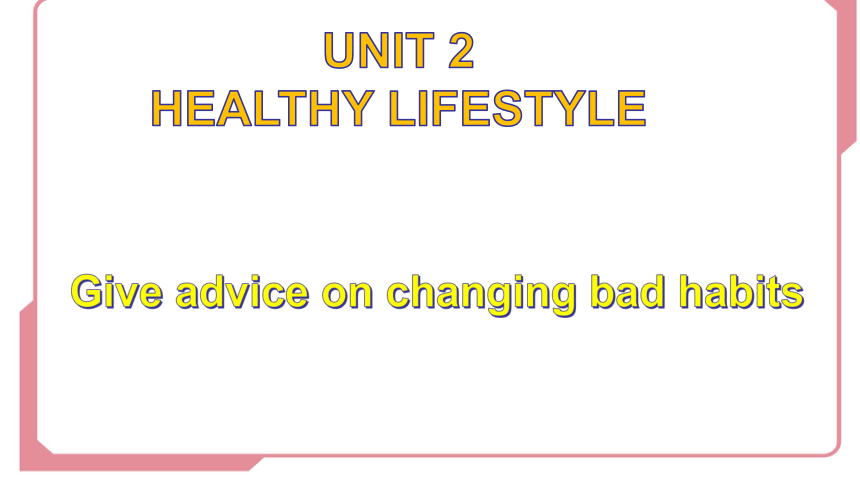
|
|
| 格式 | zip | ||
| 文件大小 | 55.2MB | ||
| 资源类型 | 教案 | ||
| 版本资源 | 人教版(2019) | ||
| 科目 | 英语 | ||
| 更新时间 | 2022-03-21 16:06:02 | ||
图片预览

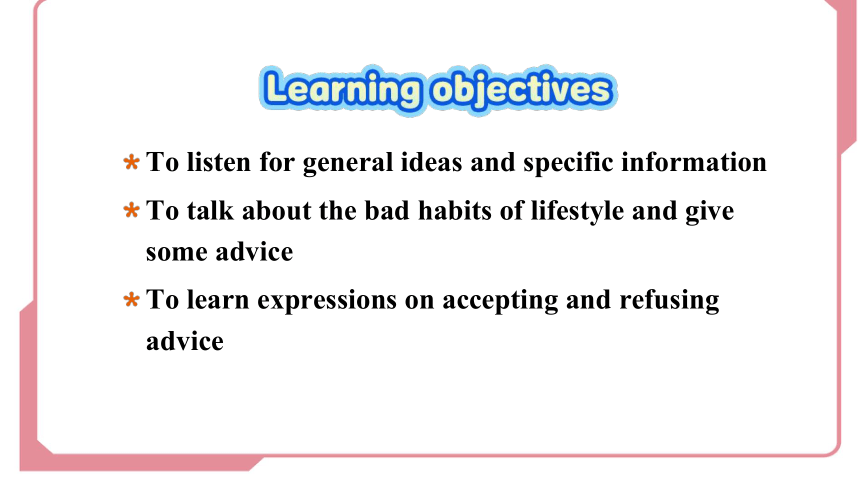

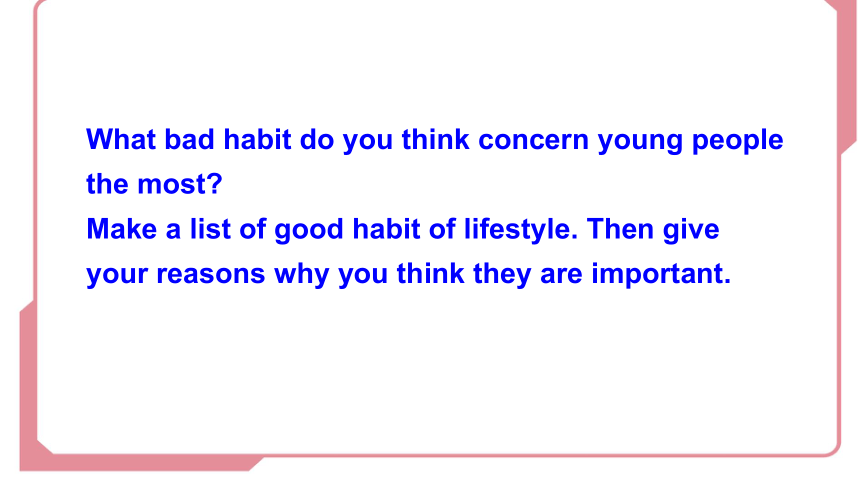
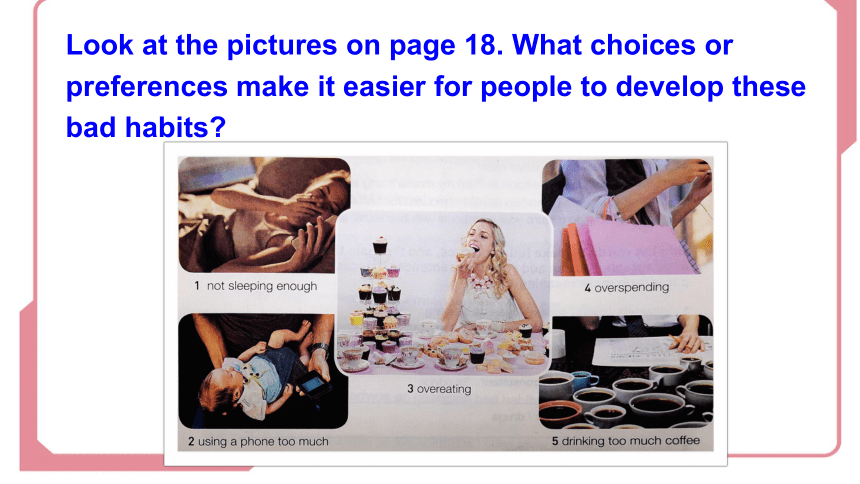
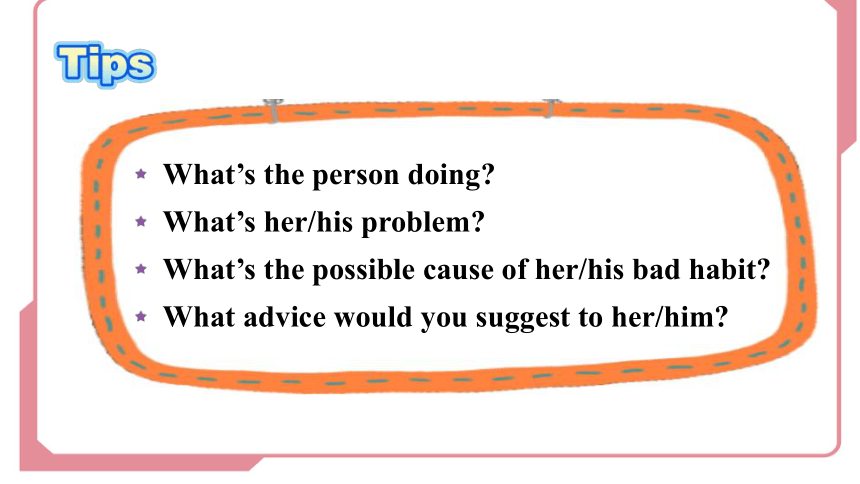
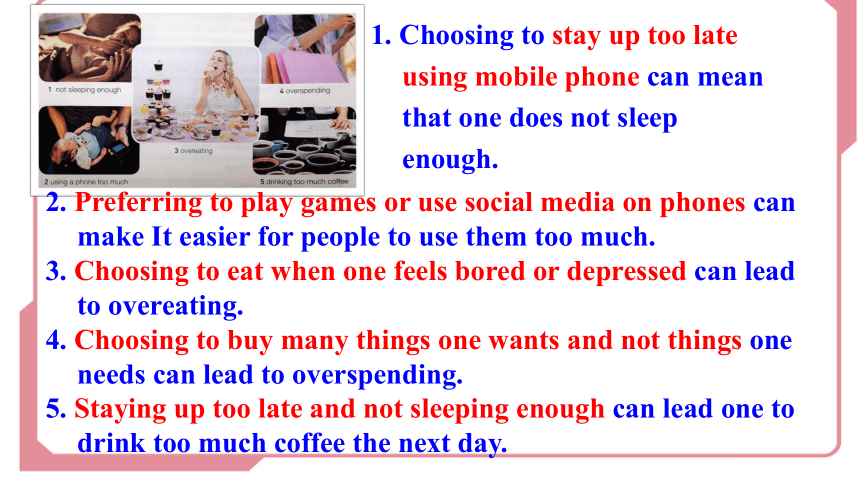
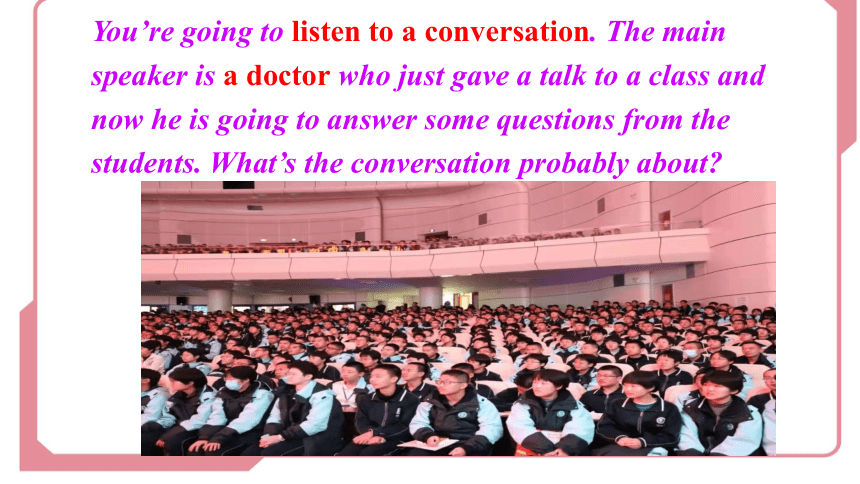
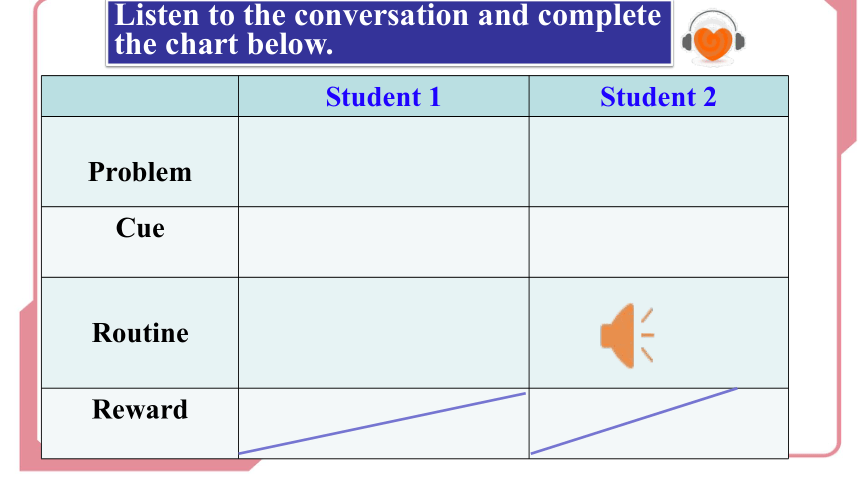
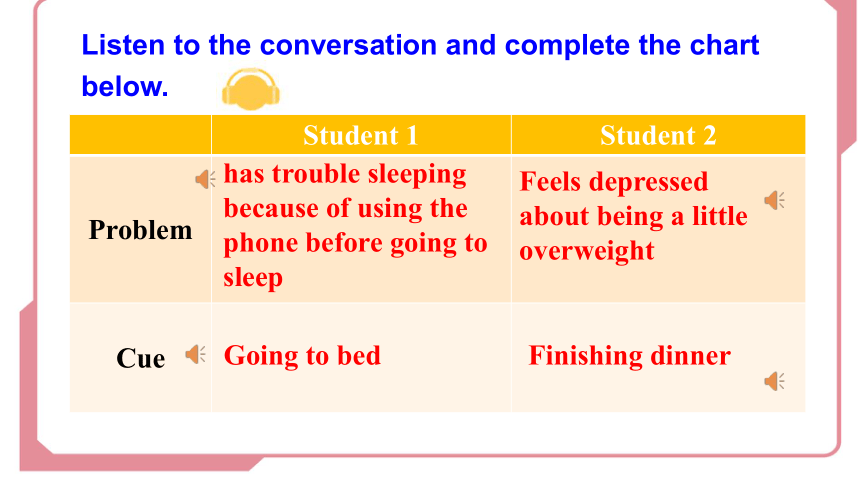
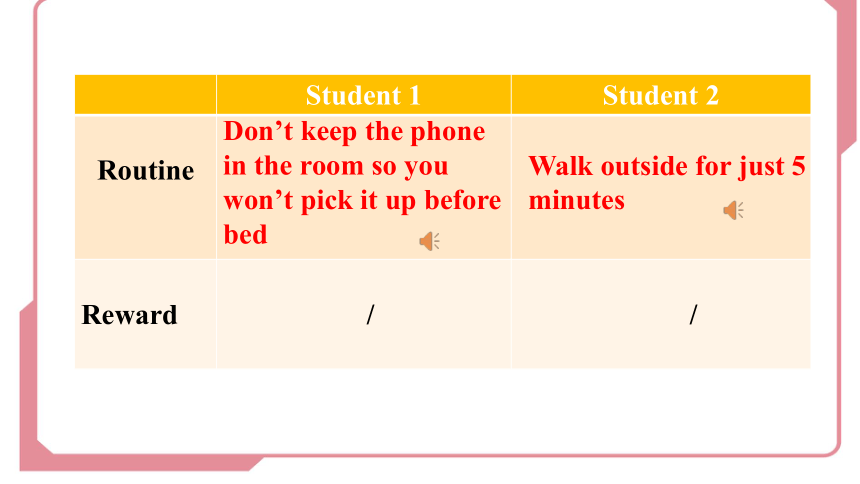
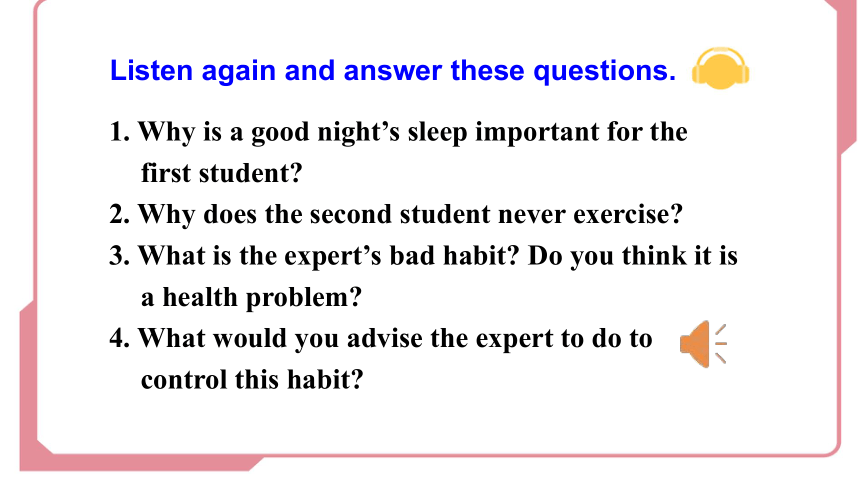
文档简介
(共38张PPT)
UNIT 2
HEALTHY LIFESTYLE
Give advice on changing bad habits
To listen for general ideas and specific information
To talk about the bad habits of lifestyle and give some advice
To learn expressions on accepting and refusing advice
What bad habit do you think concern young people the most
Make a list of good habit of lifestyle. Then give your reasons why you think they are important.
Look at the pictures on page 18. What choices or preferences make it easier for people to develop these bad habits
What’s the person doing
What’s her/his problem
What’s the possible cause of her/his bad habit
What advice would you suggest to her/him
1. Choosing to stay up too late using mobile phone can mean that one does not sleep enough.
2. Preferring to play games or use social media on phones can make It easier for people to use them too much.
3. Choosing to eat when one feels bored or depressed can lead to overeating.
4. Choosing to buy many things one wants and not things one needs can lead to overspending.
5. Staying up too late and not sleeping enough can lead one to drink too much coffee the next day.
You’re going to listen to a conversation. The main speaker is a doctor who just gave a talk to a class and now he is going to answer some questions from the students. What’s the conversation probably about
Listen to the conversation and complete the chart below.
Student 1 Student 2
Problem
Cue
Routine
Reward
Listen to the conversation and complete the chart below.
Student 1 Student 2
Problem
Cue
has trouble sleeping because of using the phone before going to sleep
Feels depressed about being a little overweight
Going to bed
Finishing dinner
Student 1 Student 2
Routine
Reward / /
Don’t keep the phone in the room so you won’t pick it up before bed
Walk outside for just 5 minutes
Listen again and answer these questions.
1. Why is a good night’s sleep important for the first student
2. Why does the second student never exercise
3. What is the expert’s bad habit Do you think it is a health problem
4. What would you advise the expert to do to control this habit
1. Why is a good night’s sleep important for the first student
A good night’s sleep is important because it will help with their schoolwork.
2. Why does the second student never exercise
Because he always picks up his phone instead of exercising.
3. What is the expert’s bad habit Do you think it is a health problem
The expert drinks too much coffee. It can be a health problem because too much is bad for the heart and can cause headaches and other problems.
4. What would you advise the expert to do to control this habit
I would suggest that the expert change the habit slowly by drinking smaller cups of weak coffee, and then try to change coffee for another drink. Later he should do more exercise as this can stimulate the body like coffee does but has more positive benefits.
Breaking and building habits
T=teacher D = Doctor S1 = Student 1 S2 = Student 2
T: Thank you so much for speaking to the class, Doctor. It was a really interesting talk.
D: That’s very kind of you.
T: Could you answer some questions about habits and lifestyle from the students
D: Sure. I’d love to.
S1: Hello. I have trouble sleeping. It often takes me a long time to fall asleep at night. It’s affecting my schoolwork because I’m always tired in the daytime.
D: I see. What do you do just before you go to sleep
S1: I usually pick up my phone.
D: Oh, I think the phone could be the problem. It makes your brain more active, which makes it hard to sleep. Your cue is going to bed. The routine is picking up your phone. To change the cycle, don’t keep your phone in your bedroom at night. You’ll find you sleep better, and much easier too!
Tapescript:
S1: Thanks, Doctor. I’ll give it a try.
D: You’re welcome. Any other problems I can help with
S2: Hi. I feel depressed about being a little overweight. I want to exercise every night after dinner, but I always just pick up my phone. What can I do
D: To create a good habit is the same as creating a bad one, but you must take small steps to begin with. So, your cue can still be finishing dinner, but make the routine to turn off your phone and walk outside - for just five minutes. A five-minute walk is so easy. It’s hard to say no! When this has become a habit, walk for longer. Don’t worry about losing weight at first. Focus on the habit of going out and build from there.
S2: Thanks for the advice, Doctor. I’ll try it tonight.
T: Well thank you again for your talk today, Doctor. Now, would you like a cup of coffee
D: That’s very nice of you. but I drink too much coffee. I still have some bad habits, too!
It is important to know whether what the speakers say is a fact or an opinion. An opinion is a subjective statement and a fact is objective. A fact is what really is true, while an opinion is what you believe, often using phrases like “I think/believe”, “in my opinion”, “to me” and so on.
Distinguish facts from opinions
Decide whether these statements from the conversation are facts (F) or opinions (O). Discuss the opinions with a partner and see if you agree on them.
1. ____ It was a really interesting talk.
2. ____ It often takes me half an hour to fall asleep at night.
3. ____ You look tired. Not enough sleep, right
4. ____ It is affecting my school work.
5. ____ I failed in all my school subjects this semester.
6. ____ I usually pick up my phone.
7. ____ I think the phone is the problem.
8. ____ A five-minute walk is so easy that it is hard to say no!
O
F
O
F
F
F
O
O
Choose a bad habit from the table below and have a conversation with your partner about it. The expressions below may help you.
sleeping too much
Internet addict
overeating
staying up too late
game addict
overspending
TV addict
My problem is…
I’m having problems with…
I cannot stop…
Please give me some advice about…
I think/believe you should…
So, why don’t you…
Well, have you thought about…
In my opinion, …
Asking for and giving advice
Accepting and refusing advice
Sure, I’ll do that.
That’s a good idea!
That’s just what I need!
Lovely!
Great!
Terrific idea!
Sorry, but I…
I’d like/love to…, but…
That’s a good idea, but…
Thank you for telling me, but…
It’s a nice thought, but…
I cannot…. because…
A: I think I’m watching too much TV.
B: Yeah. Me too.
C: In my opinion, you should spend your time on something more active instead. For example, try to get more exercise.
B: OK, sure, I’ll try that.
A: That’s a nice thought, but I don’t really enjoy exercising.
C: Hmm. How about reading more books instead
A: All right, maybe I can try that.
Answer the questions.
1. What’s Speaker A and B’s problem
Watching too much TV.
2. What does Speaker C suggest
Speaker C suggests that they spend time on something more active instead. For example, try to get more exercise.
3. Why didn’t Speaker A accept Speaker C’s suggestion
Because Speaker A doesn't really enjoy exercising.
4. What have you learnt from this example
5. What should you pay attention to if you're giving others advice
Give more detailed advice. Explain why this advice may help.
6. What should you pay attention to if you're refusing other's advice
Refuse politely and explain why you don’t think the suggestion is good for you so further advice would given.
focus on asking for and giving advice on ONE bad habit;
include reasonable and helpful suggestions that suit personal preference;
use proper expressions when asking for and giving advice;
use proper expressions when accepting and refusing advice.
1. Why do people do these activities
2. What do these activities have in common
3. Which of these activities do you like best and why
1.People do these activities to relax and reduce stress.
2.Many of these activities are relaxing.
3.I like reading and listening to music best because they can both
take me to a more relaxed state of mind.
Listen to a speech and answer these questions
1. Who do you think the speaker is talking to
2. What do many students worry about
3. What puts your health at risk
4. What did the student do in the evening
5. What was the problem with the way she tried to relax
Listen to a speech and answer these questions
1. Who do you think the speaker is talking to
I think the speaker is talking to students.
2. What do many students worry about
Many students worry about schoolwork , tests and exams.
3. What puts your health at risk
Worrying too much and living with high levels of stress put your
health at risk.
4. What did the student do in the evening
5. What was the problem with the way she tried to relax
Listen to a speech and answer these questions
4. What did the student do in the evening
In the evening the students
watched soap operas on her smartphone.
5. What was the problem with the way she tried to relax
The problem with the way she tried to relax was
that it was also exhausting her eyes.
Listen again and take notes on the speaker’s tips.
tip1 tip2 tip3
Do what
For how long
Details/Examples
Result
Take a short break
Every 45 minutes to one hour
Get up from the seat, look into the distance, get some fresh air
Feel refreshed
Exercise
30 minutes or more a day
Try a new sport, ride a bike , walk
Take your mind off worries
Take up a hobby
20 minutes a day
Sing and dance, play badminton or go bowling, paint
Make yourself happier and reduce stress
In groups, discuss these questions.
1. In what other ways can people relax
2. In your life, what things make you stressed
3. What do you do to reduce stress and relax
4. Which of the speaker’s tips do you think would work for you
In groups, discuss these questions.
1. In what other ways can people relax
People can also relax by meditating or by doing some volunteering
work in their local community. Helping others makes you appreciate
and be grateful for what you have.
2. In your life, what things make you stressed
In my life, small things like tests as well as bigger issues such as
climate change bring me stress.
3. What do you do to reduce stress and relax
To reduce stress and relax, I read novels. This helps take me to
another world in my imagination , and I can switch off from what is
around me for a short while.
4. Which of the speaker’s tips do you think would work for you
In groups, discuss these questions.
4. Which of the speaker’s tips do you think would work for you
I think the speaker’s tips about having a hobby would work for me. It is very satisfying to make or create somethingm, and that feeling hellps reduce stress.
Listening and Speaking
Students always have lots of schoolwork to do,and then there are tests and exams to worry about. While its OK to worry a little, be careful not to worry too much. If you're living with high levels of stress, you're putting your health at risk. You should find time to relax, but you should also pay attention to your ways of relaxation. One day, a student complained to me that her eyes often hurt. I asked her what she did every day, and she told me she studied during the day and then watched soap operas on her smartphone in the evening. Of course, I guessed immediately what the cause of the eye pain might be.
You see, during the daytime, she was using her eyes to study from books, and during the evening, she was using her eyes to watch soap operas on her smartphone. No wonder her eyes were hurting—she chose the wrong way to relax! When she relaxed by watching soap operas, she was able to rest her brain but at the expense of her eyes.
Tapescript:
Let me give you some tips:
1.Take a short break every 45 minutes to one hour. Get up from your seat, look into the distance, and try to get some fresh air. You will feel greatly refreshed.
2. Exercise for 30 minutes or more a day. Try a new sport, ride a bike to school, or walk a lot. It will take your mind off your daily worries and it's healthy, too.
3. Take up a hobby. Give yourself 20 minutes a day to do something you really like. Sing and dance , play badminton or go bowling, paint. This will make you happier and help reduce stress.
Remember: All work and no play makes Jack a dull boy. With these techniques, you should feel much more relaxed, allowing you to perform much better in your schoolwork.
Tapescript:
Read the script and take notes.
UNIT 2
HEALTHY LIFESTYLE
Give advice on changing bad habits
To listen for general ideas and specific information
To talk about the bad habits of lifestyle and give some advice
To learn expressions on accepting and refusing advice
What bad habit do you think concern young people the most
Make a list of good habit of lifestyle. Then give your reasons why you think they are important.
Look at the pictures on page 18. What choices or preferences make it easier for people to develop these bad habits
What’s the person doing
What’s her/his problem
What’s the possible cause of her/his bad habit
What advice would you suggest to her/him
1. Choosing to stay up too late using mobile phone can mean that one does not sleep enough.
2. Preferring to play games or use social media on phones can make It easier for people to use them too much.
3. Choosing to eat when one feels bored or depressed can lead to overeating.
4. Choosing to buy many things one wants and not things one needs can lead to overspending.
5. Staying up too late and not sleeping enough can lead one to drink too much coffee the next day.
You’re going to listen to a conversation. The main speaker is a doctor who just gave a talk to a class and now he is going to answer some questions from the students. What’s the conversation probably about
Listen to the conversation and complete the chart below.
Student 1 Student 2
Problem
Cue
Routine
Reward
Listen to the conversation and complete the chart below.
Student 1 Student 2
Problem
Cue
has trouble sleeping because of using the phone before going to sleep
Feels depressed about being a little overweight
Going to bed
Finishing dinner
Student 1 Student 2
Routine
Reward / /
Don’t keep the phone in the room so you won’t pick it up before bed
Walk outside for just 5 minutes
Listen again and answer these questions.
1. Why is a good night’s sleep important for the first student
2. Why does the second student never exercise
3. What is the expert’s bad habit Do you think it is a health problem
4. What would you advise the expert to do to control this habit
1. Why is a good night’s sleep important for the first student
A good night’s sleep is important because it will help with their schoolwork.
2. Why does the second student never exercise
Because he always picks up his phone instead of exercising.
3. What is the expert’s bad habit Do you think it is a health problem
The expert drinks too much coffee. It can be a health problem because too much is bad for the heart and can cause headaches and other problems.
4. What would you advise the expert to do to control this habit
I would suggest that the expert change the habit slowly by drinking smaller cups of weak coffee, and then try to change coffee for another drink. Later he should do more exercise as this can stimulate the body like coffee does but has more positive benefits.
Breaking and building habits
T=teacher D = Doctor S1 = Student 1 S2 = Student 2
T: Thank you so much for speaking to the class, Doctor. It was a really interesting talk.
D: That’s very kind of you.
T: Could you answer some questions about habits and lifestyle from the students
D: Sure. I’d love to.
S1: Hello. I have trouble sleeping. It often takes me a long time to fall asleep at night. It’s affecting my schoolwork because I’m always tired in the daytime.
D: I see. What do you do just before you go to sleep
S1: I usually pick up my phone.
D: Oh, I think the phone could be the problem. It makes your brain more active, which makes it hard to sleep. Your cue is going to bed. The routine is picking up your phone. To change the cycle, don’t keep your phone in your bedroom at night. You’ll find you sleep better, and much easier too!
Tapescript:
S1: Thanks, Doctor. I’ll give it a try.
D: You’re welcome. Any other problems I can help with
S2: Hi. I feel depressed about being a little overweight. I want to exercise every night after dinner, but I always just pick up my phone. What can I do
D: To create a good habit is the same as creating a bad one, but you must take small steps to begin with. So, your cue can still be finishing dinner, but make the routine to turn off your phone and walk outside - for just five minutes. A five-minute walk is so easy. It’s hard to say no! When this has become a habit, walk for longer. Don’t worry about losing weight at first. Focus on the habit of going out and build from there.
S2: Thanks for the advice, Doctor. I’ll try it tonight.
T: Well thank you again for your talk today, Doctor. Now, would you like a cup of coffee
D: That’s very nice of you. but I drink too much coffee. I still have some bad habits, too!
It is important to know whether what the speakers say is a fact or an opinion. An opinion is a subjective statement and a fact is objective. A fact is what really is true, while an opinion is what you believe, often using phrases like “I think/believe”, “in my opinion”, “to me” and so on.
Distinguish facts from opinions
Decide whether these statements from the conversation are facts (F) or opinions (O). Discuss the opinions with a partner and see if you agree on them.
1. ____ It was a really interesting talk.
2. ____ It often takes me half an hour to fall asleep at night.
3. ____ You look tired. Not enough sleep, right
4. ____ It is affecting my school work.
5. ____ I failed in all my school subjects this semester.
6. ____ I usually pick up my phone.
7. ____ I think the phone is the problem.
8. ____ A five-minute walk is so easy that it is hard to say no!
O
F
O
F
F
F
O
O
Choose a bad habit from the table below and have a conversation with your partner about it. The expressions below may help you.
sleeping too much
Internet addict
overeating
staying up too late
game addict
overspending
TV addict
My problem is…
I’m having problems with…
I cannot stop…
Please give me some advice about…
I think/believe you should…
So, why don’t you…
Well, have you thought about…
In my opinion, …
Asking for and giving advice
Accepting and refusing advice
Sure, I’ll do that.
That’s a good idea!
That’s just what I need!
Lovely!
Great!
Terrific idea!
Sorry, but I…
I’d like/love to…, but…
That’s a good idea, but…
Thank you for telling me, but…
It’s a nice thought, but…
I cannot…. because…
A: I think I’m watching too much TV.
B: Yeah. Me too.
C: In my opinion, you should spend your time on something more active instead. For example, try to get more exercise.
B: OK, sure, I’ll try that.
A: That’s a nice thought, but I don’t really enjoy exercising.
C: Hmm. How about reading more books instead
A: All right, maybe I can try that.
Answer the questions.
1. What’s Speaker A and B’s problem
Watching too much TV.
2. What does Speaker C suggest
Speaker C suggests that they spend time on something more active instead. For example, try to get more exercise.
3. Why didn’t Speaker A accept Speaker C’s suggestion
Because Speaker A doesn't really enjoy exercising.
4. What have you learnt from this example
5. What should you pay attention to if you're giving others advice
Give more detailed advice. Explain why this advice may help.
6. What should you pay attention to if you're refusing other's advice
Refuse politely and explain why you don’t think the suggestion is good for you so further advice would given.
focus on asking for and giving advice on ONE bad habit;
include reasonable and helpful suggestions that suit personal preference;
use proper expressions when asking for and giving advice;
use proper expressions when accepting and refusing advice.
1. Why do people do these activities
2. What do these activities have in common
3. Which of these activities do you like best and why
1.People do these activities to relax and reduce stress.
2.Many of these activities are relaxing.
3.I like reading and listening to music best because they can both
take me to a more relaxed state of mind.
Listen to a speech and answer these questions
1. Who do you think the speaker is talking to
2. What do many students worry about
3. What puts your health at risk
4. What did the student do in the evening
5. What was the problem with the way she tried to relax
Listen to a speech and answer these questions
1. Who do you think the speaker is talking to
I think the speaker is talking to students.
2. What do many students worry about
Many students worry about schoolwork , tests and exams.
3. What puts your health at risk
Worrying too much and living with high levels of stress put your
health at risk.
4. What did the student do in the evening
5. What was the problem with the way she tried to relax
Listen to a speech and answer these questions
4. What did the student do in the evening
In the evening the students
watched soap operas on her smartphone.
5. What was the problem with the way she tried to relax
The problem with the way she tried to relax was
that it was also exhausting her eyes.
Listen again and take notes on the speaker’s tips.
tip1 tip2 tip3
Do what
For how long
Details/Examples
Result
Take a short break
Every 45 minutes to one hour
Get up from the seat, look into the distance, get some fresh air
Feel refreshed
Exercise
30 minutes or more a day
Try a new sport, ride a bike , walk
Take your mind off worries
Take up a hobby
20 minutes a day
Sing and dance, play badminton or go bowling, paint
Make yourself happier and reduce stress
In groups, discuss these questions.
1. In what other ways can people relax
2. In your life, what things make you stressed
3. What do you do to reduce stress and relax
4. Which of the speaker’s tips do you think would work for you
In groups, discuss these questions.
1. In what other ways can people relax
People can also relax by meditating or by doing some volunteering
work in their local community. Helping others makes you appreciate
and be grateful for what you have.
2. In your life, what things make you stressed
In my life, small things like tests as well as bigger issues such as
climate change bring me stress.
3. What do you do to reduce stress and relax
To reduce stress and relax, I read novels. This helps take me to
another world in my imagination , and I can switch off from what is
around me for a short while.
4. Which of the speaker’s tips do you think would work for you
In groups, discuss these questions.
4. Which of the speaker’s tips do you think would work for you
I think the speaker’s tips about having a hobby would work for me. It is very satisfying to make or create somethingm, and that feeling hellps reduce stress.
Listening and Speaking
Students always have lots of schoolwork to do,and then there are tests and exams to worry about. While its OK to worry a little, be careful not to worry too much. If you're living with high levels of stress, you're putting your health at risk. You should find time to relax, but you should also pay attention to your ways of relaxation. One day, a student complained to me that her eyes often hurt. I asked her what she did every day, and she told me she studied during the day and then watched soap operas on her smartphone in the evening. Of course, I guessed immediately what the cause of the eye pain might be.
You see, during the daytime, she was using her eyes to study from books, and during the evening, she was using her eyes to watch soap operas on her smartphone. No wonder her eyes were hurting—she chose the wrong way to relax! When she relaxed by watching soap operas, she was able to rest her brain but at the expense of her eyes.
Tapescript:
Let me give you some tips:
1.Take a short break every 45 minutes to one hour. Get up from your seat, look into the distance, and try to get some fresh air. You will feel greatly refreshed.
2. Exercise for 30 minutes or more a day. Try a new sport, ride a bike to school, or walk a lot. It will take your mind off your daily worries and it's healthy, too.
3. Take up a hobby. Give yourself 20 minutes a day to do something you really like. Sing and dance , play badminton or go bowling, paint. This will make you happier and help reduce stress.
Remember: All work and no play makes Jack a dull boy. With these techniques, you should feel much more relaxed, allowing you to perform much better in your schoolwork.
Tapescript:
Read the script and take notes.
